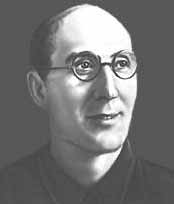Sergei Tretyakov (writer) facts for kids
Sergei Mikhailovich Tretyakov (Russian: Серге́й Миха́йлович Третьяко́в; born June 20, 1892, in Kuldīga, Latvia – died September 10, 1937, in Moscow, USSR) was an important Soviet Russian writer, playwright, and poet. He was also a special reporter for the newspaper Pravda. He was known for his connection to a style of art called constructivism.
Contents
Life and Career
Sergei Tretyakov was born to a Russian father, Mikhail Konstantinovich Tretyakov, who was a school teacher, and a Baltic German mother, Elizaveta Emmanuilovna Tretyakova. He finished his law studies at Moscow University in 1916.
He started publishing his writings in 1913. Before the Russian Revolution, he joined a group of artists called the ego-futurists. These artists wanted to create new and modern art. In 1919, he married Ol’ga Viktorovna Gomolitskaya. After publishing his book of poems called Iron Pause, he became very involved in the futurist movement in Siberia. He worked with other artists like Nikolay Aseyev and David Burlyuk.
Constructivism and LEF
Tretyakov helped start an important art journal called LEF (1923–1925) and its follow-up, Novyi LEF (1927–1928). These journals were part of an art movement called constructivism. The main leader of this group was the poet Vladimir Mayakovsky.
Constructivist artists believed that art should be useful for society and help build a new world after the revolution. They wanted to create art that was modern and experimental. Sergei Tretyakov believed that art should serve a very practical purpose in the new society.
Plays and Travels
Tretyakov's first play was Earth Rampant, also known as The World Turned Upside Down. It was directed by Vsevolod Meyerhold and first shown on March 4, 1923. The play was very popular and helped save the Moscow's Sohn Theatre from closing.
His next two plays, Can You Hear Me, Moscow? and Gas Masks (both from 1924), were directed by the young filmmaker Sergei Eisenstein. For Gas Masks, the play was even staged inside a real gas factory in Moscow to make it feel more real.
In 1924, Sergei Tretyakov visited China for a long time. While there, he taught Russian literature and gathered ideas for his future writings. His play Roar China (Rychi Kitai), which was about an event in China, opened in 1926. It became very popular and even toured in other countries and around the USSR.
Tretyakov also wrote a play called I Want a Baby (1926). This play explored new ideas about family and society, which made it quite controversial. The famous director Meyerhold wanted to produce it, but it took four years to get approval from the authorities.
Between 1930 and 1931, Tretyakov traveled to Germany, Denmark, and Austria. He translated and helped make other European writers, like Bertolt Brecht, more known in the USSR. Brecht even stayed with Tretyakov in 1935. Tretyakov also wrote song lyrics for the film Song of Heroes (1932).
Later Life
During a difficult time in Soviet history, Sergei Tretyakov was arrested in July 1937. He was accused of serious wrongdoings, partly because he had many friends who were foreign writers. His play I Want a Baby was later criticized by the authorities. He died in September 1937. In 1956, he was officially cleared of the accusations against him.
People He Worked With
Sergei Tretyakov collaborated with many important artists and thinkers of his time:
- Vsevolod Meyerhold (director)
- Sergei Eisenstein (director)
- El Lissitzky (stage designer)
- Vladimir Mayakovsky (poet, playwright)
- Osip Brik (literary theorist, essayist)
- Alexander Rodchenko (artist and photographer)
- Varvara Stepanova (constructivist artist and textile designer)
Works
Here are some of Sergei Tretyakov's notable works:
- "Roar China!: A Drama in Seven Scenes" (1930)
- "Iron Pause" (1919) – a book of poems
- "I Want a Baby!" (1995 English publication)
- "Gas Masks" (1924)
- "Can You Hear, Moscow?" (1924)
- "A Chinese Testament: The Autobiography of Tan Shih-hua" (1934)
- "The Country Crossroad: Five Weeks in Czechoslovakia" (1937)
Other notable performances of his works:
- Immaconcep – a play about the creation of the Komsomol (a youth organization). Meyerhold's students performed this play for youth and workers' clubs.
- The World Turned Upside Down – an adaptation of a poem by Marcel Martinet. It was performed at the Meyerhold Theatre in Moscow in 1923.


